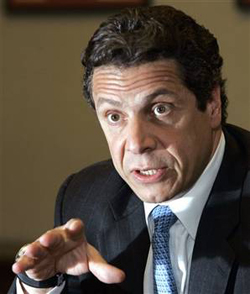 New York governor Andrew M. Cuomo may have tabled his push for a new casino referendum, but you have to give the man credit for still burning the midnight oil. In an attempt to lay the groundwork for what looks like a renewed push next year, Cuomo recently signed an agreement with St. Regis Mohawk tribal leaders to ensure that the latter keeps its exclusive casino territory in northern New York while paying the state $30 million in gambling proceeds that have been withheld.
New York governor Andrew M. Cuomo may have tabled his push for a new casino referendum, but you have to give the man credit for still burning the midnight oil. In an attempt to lay the groundwork for what looks like a renewed push next year, Cuomo recently signed an agreement with St. Regis Mohawk tribal leaders to ensure that the latter keeps its exclusive casino territory in northern New York while paying the state $30 million in gambling proceeds that have been withheld.
As part of the agreement, the state will remove the eight-county territory from the governor’s proposed casino expansion plans, which would include three new establishments in upstate New York. In return, the Mohawk tribe have agreed to resume paying 25 percent of future gambling revenues to the state.
In addition, an extra $30 million in state proceeds are still being held in an escrow account and has been the subject of negotiations stemming from a breakaway Mohawk group establishing its own gambling center without getting state approval. This casino, which is different from the Akwesasne Mohawk Casino in Hogansburg, New York is also the subject of negotiations, particularly for the Mohawk tribe who is negotiating a reduction in the payments related to this “unauthorized” gambling location.
Cuomo’s talks with the Mohawk tribe can be see as an attempt to lay the foundation and establish parameters on his administration’s plan to add more casinos to the state. He also came to an agreement with the Oneida tribe earlier this month, promising them that the new casinos will not be built on the tribe’s exclusive gambling territory in exchange for sharing some of its revenues with the state.
As far as the agreement with the Mohawk tribe is concerned, one of its leaders, Chief Paul Thompson, explained that the deal with the state wasn’t so much about the finances as it was about land claim. The tribe, according to the chief, needs more space for homes and businesses, particularly because its community is running out of land for houses on its territory.
